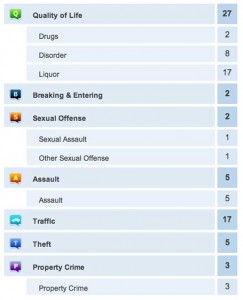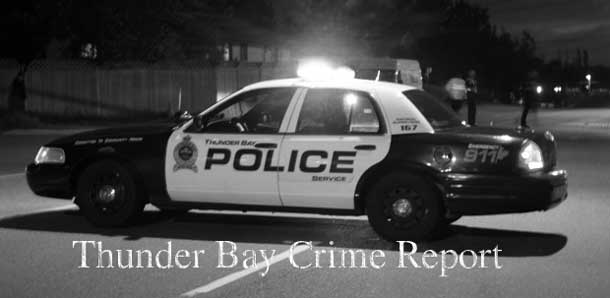 THUNDER BAY – Thunder Bay Police were kept busy last night. Mayor Keith Hobbs even got engaged, making a citizen’s arrest of an apparently intoxicated individual at the Community Auditorium during the Mining Readiness presentation.
THUNDER BAY – Thunder Bay Police were kept busy last night. Mayor Keith Hobbs even got engaged, making a citizen’s arrest of an apparently intoxicated individual at the Community Auditorium during the Mining Readiness presentation.
Quality of Life calls topped the agenda for Police Officers once again. Of the 54 calls for service police received 27 of those calls were drug or alcohol related.
Police also dealt with two sexual assaults, one on North Brodie Street. Another was an indecent act at the 1000 Block of Memorial Avenue.
 Daily Crime Report
Daily Crime Report
Five assaults happened over the report period as well. There were two break and enters, five instances of property crime and 19 traffic related stops by police.
Keep up on the incidents of crime in your neighbourhood on Crime Mapping.
Citizen’s Arrest in Canada
New legislation came into effect on Citizen’s Arrests in March 2013.
The Citizen’s Arrest and Self-defence Act changes the previous legislation. Now, a citizen is not required to catch a suspect red-handed in commission of a crime. The new legislation, enacted by the Conservative Government allows for the apprehension and arrest of a suspect within a reasonable amount of time after the commission of a crime.
Here is the legislation:
Defence — use or threat of force
-
34. (1) A person is not guilty of an offence if
-
(a) they believe on reasonable grounds that force is being used against them or another person or that a threat of force is being made against them or another person;
-
(b) the act that constitutes the offence is committed for the purpose of defending or protecting themselves or the other person from that use or threat of force; and
-
(c) the act committed is reasonable in the circumstances.
-
-
Marginal note:Factors
(2) In determining whether the act committed is reasonable in the circumstances, the court shall consider the relevant circumstances of the person, the other parties and the act, including, but not limited to, the following factors:
-
(a) the nature of the force or threat;
-
(b) the extent to which the use of force was imminent and whether there were other means available to respond to the potential use of force;
-
(c) the person’s role in the incident;
-
(d) whether any party to the incident used or threatened to use a weapon;
-
(e) the size, age, gender and physical capabilities of the parties to the incident;
-
(f) the nature, duration and history of any relationship between the parties to the incident, including any prior use or threat of force and the nature of that force or threat;
-
(f.1) any history of interaction or communication between the parties to the incident;
-
(g) the nature and proportionality of the person’s response to the use or threat of force; and
-
(h) whether the act committed was in response to a use or threat of force that the person knew was lawful.
-
-
Marginal note:No defence
(3) Subsection (1) does not apply if the force is used or threatened by another person for the purpose of doing something that they are required or authorized by law to do in the administration or enforcement of the law, unless the person who commits the act that constitutes the offence believes on reasonable grounds that the other person is acting unlawfully.
Defence of Property
Marginal note:Defence —property
-
35. (1) A person is not guilty of an offence if
-
(a) they either believe on reasonable grounds that they are in peaceable possession of property or are acting under the authority of, or lawfully assisting, a person whom they believe on reasonable grounds is in peaceable possession of property;
-
(b) they believe on reasonable grounds that another person
-
(i) is about to enter, is entering or has entered the property without being entitled by law to do so,
-
(ii) is about to take the property, is doing so or has just done so, or
-
(iii) is about to damage or destroy the property, or make it inoperative, or is doing so;
-
-
(c) the act that constitutes the offence is committed for the purpose of
-
(i) preventing the other person from entering the property, or removing that person from the property, or
-
(ii) preventing the other person from taking, damaging or destroying the property or from making it inoperative, or retaking the property from that person; and
-
-
(d) the act committed is reasonable in the circumstances.
-
-
Marginal note:No defence
(2) Subsection (1) does not apply if the person who believes on reasonable grounds that they are, or who is believed on reasonable grounds to be, in peaceable possession of the property does not have a claim of right to it and the other person is entitled to its possession by law.
-
Marginal note:No defence
(3) Subsection (1) does not apply if the other person is doing something that they are required or authorized by law to do in the administration or enforcement of the law, unless the person who commits the act that constitutes the offence believes on reasonable grounds that the other person is acting unlawfully.
-
3. (1) Subsection 494(2) of the Act is replaced by the following:
-
Marginal note:Arrest by owner, etc., of property
(2) The owner or a person in lawful possession of property, or a person authorized by the owner or by a person in lawful possession of property, may arrest a person without a warrant if they find them committing a criminal offence on or in relation to that property and
-
(a) they make the arrest at that time; or
-
(b) they make the arrest within a reasonable time after the offence is committed and they believe on reasonable grounds that it is not feasible in the circumstances for a peace officer to make the arrest.
-
-
-
(2) Section 494 of the Act is amended by adding the following after subsection (3):
-
Marginal note:For greater certainty
(4) For greater certainty, a person who is authorized to make an arrest under this section is a person who is authorized by law to do so for the purposes of section 25.
-
For the safety of citizens, the use of common sense is vital. The change in legislation is not meant to allow individual citizens or groups of citizens to form posses and head out to fight crime.








